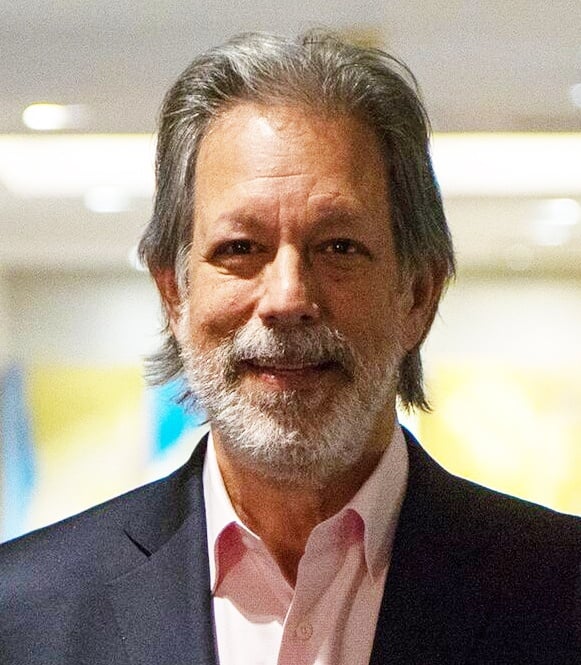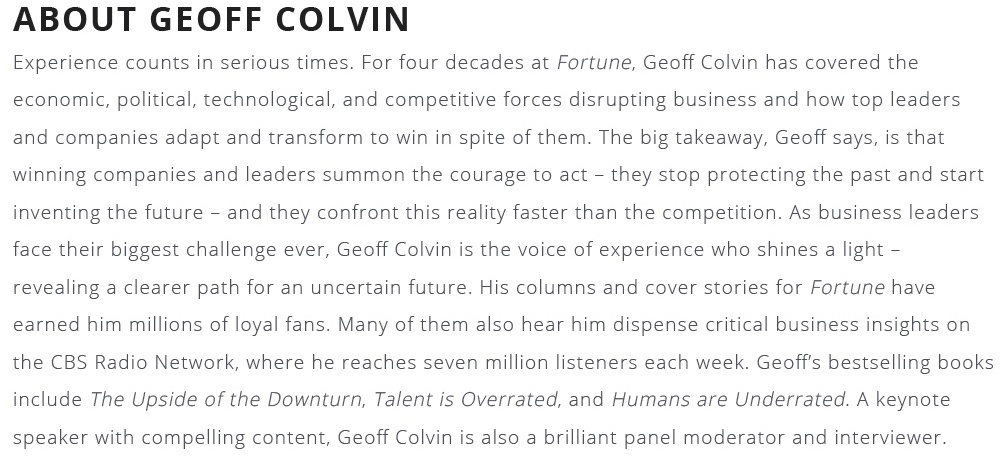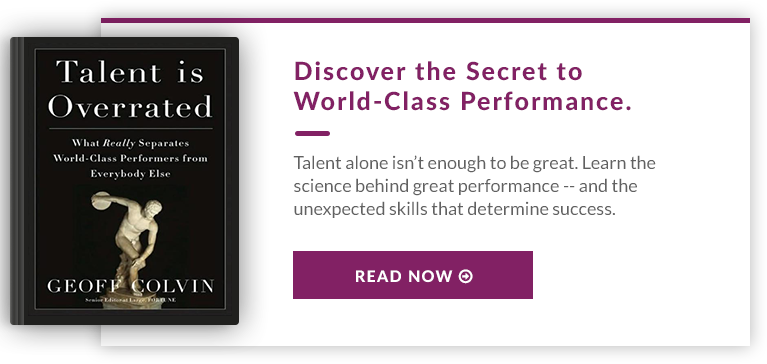Why Talent Is Overrated: Leadership & Performance Expert Geoff Colvin
WHAT YOU BELIEVE ABOUT PEAK PERFORMANCE IS LIKELY WRONG
What separates great achievers from everyone else? The answer might surprise you.
GEOFF COLVIN from Fortune magazine wanted to get the answer to the question: where does great, world class performance come from? We’ve all seen brilliant performers at work, in sports, the arts, elsewhere. How did they come to be so . . . amazing? Is it the result of hard work? Is it inherited or natural skill? Is it something else?
The Secret to Peak Performance: It's Something Else
What if everything you’ve come to believe about raw/natural talent, hard work, and great performance is flat-out wrong? Scientific research on world-class performance shows that what most of us believe is off-base. That means for most of our lives, we’ve been using the wrong operating manual and will never perform as well as we otherwise could.
Leadership and performance expert Geoff Colvin wrote the bestselling book that lays bare misguided misconceptions about great performance: Talent Is Overrated: What Really Separates World-Class Performers From Everybody Else. His groundbreaking book reveals the science behind great performance and dispels all the myths – giving individuals and leadership in organizations a new way of thinking about generating outstanding performance. The timing of that message couldn’t be better. In these uncertain and disruptive times, rising to a new level of performance is absolutely critical to innovation and execution in business.
Discover the secret to world-class performance.
Get instant access to the 1st chapter of Talent is Overrated by Geoff Colvin for insight into the science behind peak performance.
Can't Succeed By Meeting Old Standards
The world is changing. Competition on a global scale has altered the dynamics of business and the way people earn a living. In the friction-free economy – where money, people, and data move seamlessly – most work can be done anywhere, away from the confines of political and geographic borders. All that’s needed is a computer and an internet connection. Those ideas have radically changed what it means to be a great performer – because now you’re not just competing with the person or company in your town, or state, or country – you’re competing with the person or company in Mumbai, or Dublin, or Sydney, and they could well have better skills.
All this is raising the bar. No longer is it good enough to do business based on yesterday’s standards because the standards are being raised across the globe.
During his speeches on this topic, Geoff Colvin dramatically makes his point about rising standards. He shows a video of a 1960s vintage American sedan in a head-on crash with its modern-day counterpart. When we think of those old Detroit cars, we think of their huge mass and seeming indestructibility. Many in his audience think the vintage vehicle will fare better in the head-on crash than the newer vehicle. Why wouldn’t it? It’s enormous by comparison! This video shows different. Rising standards mean that today’s sedans – smaller and lighter – are also much safer with less damage to not only the vehicle itself, but also the passengers. This dramatic demonstration drives home the relevant point – in a world of rising standards, it is VITAL that we get better at what we’re doing, too.
The Myth of Hard Work & Natural Talent
Our view of achievement is skewed by our closely-held beliefs that people get to be better by hard work. But that’s just not so. We all know plenty of hard workers who have been doing the same job for years or decades without becoming great. And while many great performers seem to work very hard, simple hard work isn’t enough. And though top performers often seem smart, high intelligence and memory aren’t key factors either.
Next, we assume that the root of world class performance is some innate or natural gift. It must be that Mozart was born with an astounding gift for music and Michael Phelps must have been born a mermaid since he’s such a natural in the water. The trouble is scientific evidence doesn't support the notion that specific natural talents make great performers. Geoff Colvin said, "We tend to think we are forever barred from all manner of successes because of what we were or were not born with. The range of cases in which that belief is true turns out to be a great deal narrower than most of us think. The roadblocks we face seem to be mostly imaginary." So the “born to be great” argument goes out the window.
The truth is that decades of scientific research reveal that great performance in any field results from highly specific behaviors that every person and organization can adopt. As a result, when it comes to developing and leading talent, most organizations value the wrong things. The truth is passion, honesty, and learning are more valuable than what people generally believe are the sources of great performance.
Related Reading: Smart Technology & Workplace of the Future: Top Economic Expert Weighs In and Fortune's World's Greatest Leaders 2017: Who Are World's Best Leaders?
Achieving Peak Performance: The Answer is Deliberate Practice
The critical behaviors that drive world class performance constitute what researchers call “deliberate practice.” It isn’t quite what most people think of as practice, and getting it right is crucial. But it isn’t complicated, and Colvin explains exactly how it works, illustrating his points with examples from real people and real organizations. The world’s great performers, in business, sports, music, medicine, or any other realm, all engage in these basic behaviors.
Remarkably, there seems to be no limit to the performance that can be achieved by continuing deliberate practice. It’s just as effective with groups as with individuals. It improves performance not only in particular skills but also in broad, high-level abilities, such as strategizing and innovating. The result is that those who apply these key principles gain a tremendous advantage. The so-called 10,000 hours of practice creates a capacity and ability that simply can’t be duplicated – because so few people actually put in the disciplined time to do the deliberate practice it takes to make it work. It’s the foundation of peak performance.
Putting Deliberate Practice to Work
Geoff Colvin cites this example of how this idea of deliberate practice can be applied in the real world. A medical sales technology company was launching a new device they were selling to doctors and hospitals. They decided to train the sales staff in a new way using these principles. Here’s what they did:
- Salespeople attended classes to learn about the new product.
- Then they prepared presentations to teach what they had learned. The idea here: if you really want to learn anything, teach it to someone else. That’s how we learn.
- They practiced these repeatedly over a six-week period in front of managers and on videotape.
- They were constantly being pushed to make it better every time.
- Lots of feedback was provided from managers and videos of each presentation.
- They practiced using the product on simulators and did so over and over and over with instructors and feedback.
All the salespeople complained about this new sales training effort. Here’s what they said:
- This was different.
- Other people in the industry didn’t do it this way.
- They never did it this way in their own company.
- This felt strange.
- This was way more work than they were accustomed to doing to get ready for a new product introduction.
- They didn’t like it.
- It felt funny.
- It wasn’t normal.
So what was the result? In spite of feedback from the sales staff, this effort of incorporating deliberate practice was unbelievably successful.
- Before the training, 25% of customers were converting to the new product
- After the training, 95% of the customers were converting to the new product
It’s important to mention that this occurred during the height of the great recession. The managers simply could not believe the results.
The Performance Secret
So let’s put this all in context. Is it true that talent is overrated? According to these findings, absolutely. But that doesn't mean talent plays no role in success. It simply means talent alone is not enough, or even anywhere close to enough.
Whatever it is you like (or love) to do, the fact that you don't hate it means you probably have the basic tools -- and so there's no reason you can't get better, maybe a lot better. But greatness requires dedication and sacrifice, period. Being good at something requires a fair amount . . . being great requires a huge amount. If you truly desire greatness, or simply to be great at what you do, then much sacrifice is required.
In the end, that’s the most liberating message here. No one says the path to great performance is easy, but the liberating message from leadership and performance expert Geoff Colvin ought to be fuel for anyone who’s looking to get markedly better at something they do. For individuals and organizations looking to improve, there is a path.
ADD TO THE CONVERSATION: What do you think contribues to world-class performance? Leave your thoughts in the comments below! If you'd like to learn more about the science behind world-class performance, click here to gain instant access to the first chapter of Geoff Colvin's bestselling book, Talent is Overrated: What Really Separates World-Class Performers from Everybody Else.
About Tony D'Amelio
Tony has spent his career putting talented people and audiences together, first in the music business and later representing the world's leading speakers. After concluding 27 years as Executive Vice President of the Washington Speakers Bureau, Tony launched D'Amelio Network, a boutique firm that manages the speaking activities of a select group of experts on business, management, politics and current events. Clients include: Mike Abrashoff, Mariana Atencio, Chris Barton, Lisa Bodell, Geoff Colvin, Daryl Davis, Suneel Gupta, Ron Insana, Katty Kay, Polly LaBarre, Nicole Malachowski, Ken Schmidt, and Bob Woodward.

.png)

.jpg)



